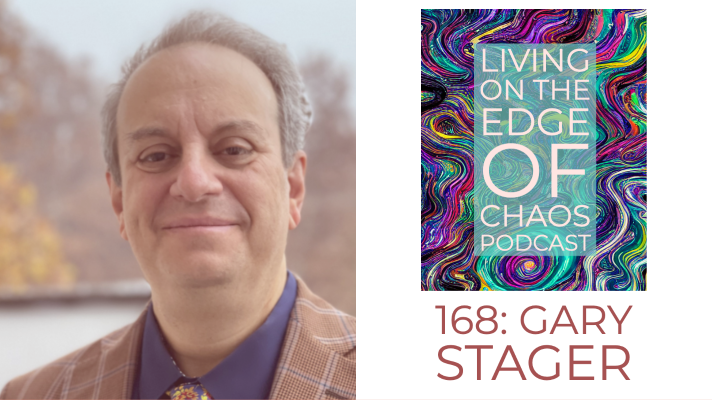In this episode of the podcast, I speak with Gary Stager. And this was a long time dream come true!
Gary Stager is a recognized pioneer in 1:1 computing, online learning, and computer science for all students. He has taught learners from preschool through the doctoral level and spent 38 years helping teachers around the world embrace technology as way of amplifying the potential of each student.
Gary is a popular keynote speaker known across the globe for his fearless advocacy on behalf of teachers and children. Educators leave his presentations energized and empowered to change their practice and the world of the kids they serve.
Did you know?
- Gary led professional development in the world’s first laptop schools (1990)
- Gary designed one of the first online masters degree programs
- Gary created an alternative learning environment for at-risk students inside a prison for teens
- Gary earned a Ph.D. in Science and Mathematics Education
- Gary was part of a team that won the 2007 Grammy Award for Best Latin Jazz Recording
- Gary was invited by Fondazione Reggio Children to lead a public seminar on education in Reggio Emilia, Italy
In addition to being a popular keynote speaker at some of the world’s most prestigious education conferences, Gary Stager is a journalist, teacher educator, consultant, professor, software developer, publisher, and school administrator. An elementary teacher by training, he has taught students from preschool through doctoral studies. In 1990, Dr. Stager led professional development in the world’s first laptop schools and played a major role in the early days of online education. Gary is the founder of the Constructing Modern Knowledge summer institute for educators.
Dr. Stager is co-author of Invent To Learn – Making, Tinkering, and Engineering in the Classroom, called the “bible of the maker movement in schools,” by Larry Magid of CBS and The San Jose Mercury News.
When Jean Piaget wanted to better understand how children learn mathematics, he hired Seymour Papert. When Dr. Papert wanted to create a high-tech alternative learning environment for incarcerated at-risk teens, he hired Gary Stager. This work was the basis for Gary’s doctoral dissertation and documented Papert’s most-recent institutional research project.
Dr. Stager’s work has earned a Ph.D. in Science and Mathematics Education and he collaborated on a project that won a Grammy Award. Recently, Gary was invited by Fondazione Reggio Children to lead a public seminar on education in Reggio Emilia, Italy.
Gary is also on the advisory board of the NSF-funded project, BJC4NYC: Bringing a Rigorous Computer Science Principles Course to the Largest School System in the US. Dr. Stager also maintains the world’s largest archive of text and multimedia by Seymour Papert at The Daily Papert.
Direct Link: https://coffeechug.simplecast.com/episodes/168
Apple Podcast – Find this episode and all the previous episodes on Apple Podcast
Spotify – Find this episode and previous episodes of the show on Spotify!
TOPICS WE EXPLORE(giving tiny tidbit for inquiry in your behalf:)
In this thought-provoking episode, we dive into the world of education and technology with renowned expert, Gary Stager. Join us as we explore:
- The journey and accomplishments of Gary Stager
- The concept of “computing” as an action, shaping how we perceive technology
- The thought-provoking question: Does the computer program the child, or does the child program the computer?
- The importance of balancing opposing ideas in modern education
Discover key insights on:
- The need for all kids to have programming experience
- The consequences of K-12 computer science curriculum
- The challenge of balancing educator experience with legislative mandates
- The idea of granting “permission” to both educators and students in the learning process
We’ll also discuss the impact of tools like ChatGPT on education, the fusion of mathematics and computing in teaching, and the power of block-based coding languages. Finally, we reflect on the role of technology in shaping education and the difference between “old” and “timeless” teaching methods.
Don’t miss this enlightening and engaging conversation with Gary Stager!
Overview Breakdown(help of Notably)
Challenges and goals:
– Integrating computing and technology effectively into education
– Addressing the lack of expertise among teachers in computer science
– Developing a K-12 curriculum that encourages students to explore their potential
– Overcoming unintended consequences of K-12 computer science requirements
– Aligning educational practices with the demands of a technologically sophisticated world
Takeaways:
– Computing should be seen as a verb, allowing students to develop agency in using technology.
– Teachers need supportive environments to learn from each other and build competence in using technology.
– Acknowledging uncertainty in education is essential for creating learning experiences that encourage exploration.
– Physical computing and project-based learning can engage students in meaningful experiences and skill development.
– Interdisciplinary learning and integrating computing into subjects like mathematics can foster curiosity and inquiry among students.
Emerging patterns:
– The importance of developing computational fluency and expertise, rather than just knowledge of vocabulary
– The need for teacher professional development and support in implementing technology in the classroom
– The value of hands-on, collaborative learning experiences for both teachers and students
– The potential for technology to serve as an intellectual laboratory and vehicle for self-expression when used effectively
YOUR CHALLENGE
Share ideas you gathered from the conversation with us on the socials.
What resonated with you?
RESOURCES MENTIONED IN SHOW
- Website – http://cmkfutures.com/
- Gary Stager Website – http://professorgarystager.com/
- Twitter – https://twitter.com/garystager
- Invent To Learn – https://inventtolearn.com/
- Book – Invent To Learn – Making, Tinkering, and Engineering in the Classroom
- Book – Twenty Things to Do with a Computer Forward 50: Future Visions of Education Inspired by Seymour Papert and Cynthia Solomon’s Seminal Work
- Adrift: America in 100 Charts
- Stephan Wolfram – What is ChatGPT Doing? and Why Does It Work?
- Constructing Modern Knowledge Summer Institute
JUST A FEW OF MY FAVORITE IDEAS FROM THE CONVERSATION!















Leave a Reply